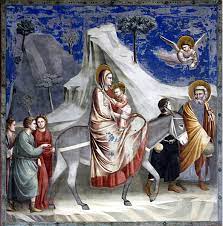Information from the Bible Society
.

What do we know about the flight into Egypt?
As we watch the news we see many stories of refugees fleeing strife or persecution in the Middle East, seeking sanctuary in safer countries. At Christmas we also remember that, after the birth of Jesus, he too was a refugee in another land. In the Bible, the story is told in Matthew 2.13–23.
How old was Jesus when the family left Bethlehem?
After the wise men had left, an angel appeared to Joseph and warned him to flee to Egypt (Matthew 2.11–13). King Herod ‘gave orders to kill all the boys in Bethlehem and its vicinity who were two years old and under, in accordance with the time he had learned from the Magi’ (verse 16); the family escaped an infanticide in the nick of time. If Herod wanted to be sure he caught his potential rival, this might suggest that Jesus was about a year old when the wise men visited Herod. It is not always easy to tell exactly how old a child is, so to make sure he got him, Herod would target all boys under the age of two.
Why did they go to Egypt?
Egypt was a logical and safe place to find refuge. Egypt and Judea were linked by a coastal road known as the Via Maris (Way of the Sea). Egypt was outside the dominions of King Herod but was part of the Roman Empire, and had large Jewish communities. The Jewish settlements of Egypt dated back to the time of Jeremiah (see Jeremiah 41.17 and 44.1). They had their own synagogues and had adopted Greek as their everyday language. The first translation of the Scriptures, which we call the Septuagint, was made in the third century BC at Alexandria in Egypt, originally for these Greek-speaking Jews.
Where did they stay?
The narrative in Matthew is very brief and does not state where in Egypt they lived. This gap in knowledge has been supplemented by tradition. Egypt’s Coptic Church remembers with pride that Egypt was the first place that Jesus went to after he left Bethlehem. Throughout historic parts of Egypt, there are many churches and shrines marking places where tradition states that the holy family stayed.
How did they pay for it?
We know that Joseph and Mary were poor. When Jesus was taken to the Temple for the ritual of purification (Luke 1.22–24), it is indicated that Mary and Joseph made the sacrifice which was specified in Leviticus 12.1–8 for poor people as the alternative to a lamb. Some people suggest that the gold that the wise men brought might have been used to pay for their travel and stay in Egypt. Certainly, the gold is not mentioned again.
How long were they in Egypt?
We don’t know how long Joseph, Mary and Jesus were in Egypt, but the Bible tells us that they stayed there until King Herod died. The story of Herod’s death is told in The Antiquities of the Jews by Josephus, where he says Herod died just after a lunar eclipse. Estimates for Herod’s death are 4 BC,
1 BC or 1 AD, depending on which eclipse is chosen to fit the events. The reliability of Josephus’s writing was shown in 2007 when, following his description, King Herod’s tomb was found as he described at Herodium, just south of Bethlehem. Estimates of how long Jesus was in Egypt before Herod’s death vary from a few weeks to a number of years. After that, the family went to live in Nazareth (see Matthew 2.19–23).
Refugees
The time Jesus spent in Egypt reminds us of the biblical imperative to care for outsiders. The Bible may not use the word ‘refugee’ but they are certainly included when the Bible says ‘The foreigners residing among you must be treated as native-born. Love them as yourself, for you were foreigners in Egypt’ (Leviticus 19.34). We may not know much about Jesus’ exile in Egypt, but it does remind us that we need to care for refugees, as Jesus himself was a refugee. Perhaps his exile in Egypt was in his mind when Jesus said, ‘For I was hungry and you gave me food; I was thirsty and you gave me a drink, I was a stranger and you took me in’ (Matthew 25.35). In the letter to the Hebrews in the New Testament we are reminded: ‘Do not forget to show hospitality to strangers’ (13.1–2).
.
The Bible Society has produced the study guide Love the Stranger, which engages with biblical texts that help our understanding of migration